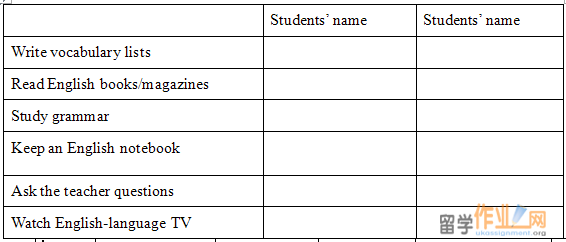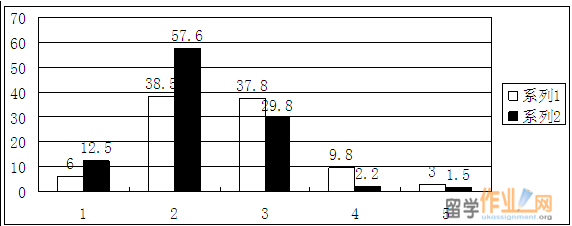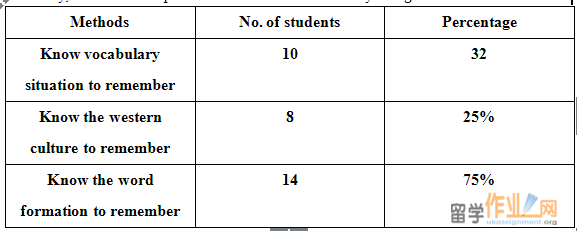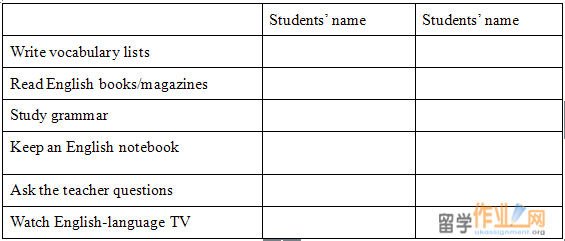|
The materials are based on the Go For It for Grade 9.
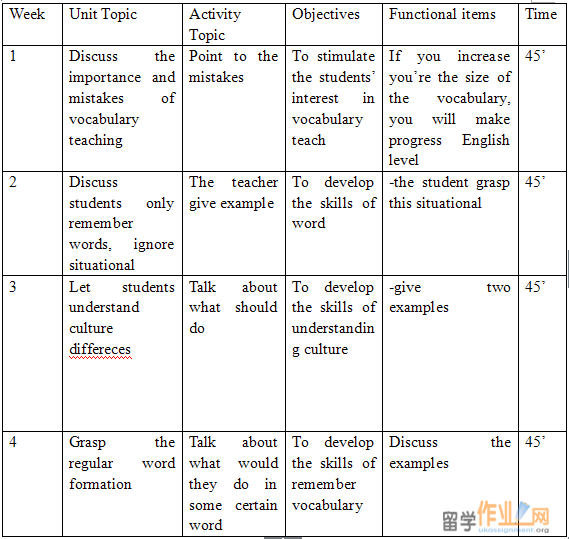 Project Implementation The objective of this research is to recognize the mistakes and grasp the methods for vocabulary. The subjects are 45 rural middle school students in Songzhuangzi Middle School in Cangzhou And the materials are based on the Go For It for Grade 9. I designed four activities to be tried out in four weeks .and these activities are reported as follows. Week 1, Activity 1, Discuss the importances and mistakes of vocabulary teaching The objective: to stimulate the students’ discuss the examples about ignoring the situational. Teaching process: Step 1 Lead in [T:(the teacher says) ; S: (the students say)] T: We all know if you can’t remember you can’t listen. speak. read .write well. S: But we must have some tests, we must do some homework. T: Though your answer, I know your mistakes. Step 2 Presentation ( Ask some other students discuss the same question. Step 3 Practice Have the students work in pairs, Discuss the question .
Step 4 Groupwork
Divide all the class into six groups, and ask them to work in group T:if you can’t remember vocabulary ,you can’t read the questions. Week 2, Activity 2, Students only remember the surface of the words’ meanings. Ignoring the situational The objective: to stimulate the students’ discuss the examples about ignoring the situational. Teaching process Step 1 lead in Teacher writes two examples on the blackboard. Step 2 Presentation 1. I am very thirsty. I want to drink some water. 2. The flowers are dry, I must water them now. Step 3 Practice Ask them to practice the conversation in pairs Discuss the nature of water. Step 4 Do a survey Divide the students into four groups, Discuss the nature of a certain word. Homework: Let students find the similar examples 1. I am very thirsty. I want to drink some water. 2. The flowers are dry, I must water them now. Homework: Find word that has similar use Week 3, Activity 3, Let students understand culture differences between China and western country The objective: to stimulate the students’ discuss the examples about ignoring the situational. Teaching process: Step1 Lead in T Do you like dogs? What’s it differences because of culture? Step 2 Presentation The teacher give some examples on the blackboard . 1. Love me ,love my dog.{爱屋及乌} 2. Every dog has his day.{凡人皆有得意日} 3. Luckdog {幸运儿} 4. 狗腿子5.狗东西 5. 狗仗人势 Step 3 Groupwork Divide the students into 4 groups . Discuss the diffenences for dogs .At last the teacher give the summary .In western country , people appreciate dogs’ courage and honest. The person is treated a dog .But Chinese all hate dogs. So for a same thing , different culture background, their opinons are different. The students talk to other students in the class and find three people who have to follow these rules. Write their names in the chart. Homework: Let students find some similar examples. Week 4 , Activity 4, Let students grasp the regular word formation The objective: to let students grasp word formation to remember vocabulary Teaching process: Step 1 Lead in T: Do you know what made of word is ? Do you recognize root , prefix and suffix? Step 2 Presentation The teacher says word is made of root, prefix and suffix. They are three element parts .Prefix is the most important part. Suffix is the secondary part. Words formation methods has many kinds of methods.eg. 1.prefix+root Pro +pel -propel {向前}{推} {推进} 2 root +suffix Port +able -portable {拿走} {可以的} {可携带的} Step 3 Practice T: discuss the words above At last the teacher give summary. Though the examples we know an English word aren’t meaningless and isolated, They are some organic combination that include the specific meaning. we should remember their meanings significance. Homework: Making a short speech about what would you do if you were a teacher. 4.2 Data Analysis At the end of the research, the second questionnaire survey was done to collect the information about the results of the new Teaching-plan. After making an analysis and made the comparison between the results of the two questionnaires I have learned that my students’ interest in oral work has been increased by well-designed oral work. Data from the questionaires The results of the two questionnaires are presented in Graph 1 and Table 1. Graph 1 shows the comparison of degree of interest before and after the implementation of the project. And table 1 shows students’ preference to types of oral practice. After four weeks’ research, I designed Questionnaire Two that was partly based on Questionnaire One designed before research. By now, I was more awake of the usefulness of the oral practice I designed. I especially hoped to know what my students had gained and which methods they preferred. The fact that the degree of interest increased from 38.5% before implementation of the project to 57.6% after it shows that the activities to enhance students’ interest in oral practice were effective. Graph 1 shows that there is a drastic improvement in students’ interest of remember vocabulary .Most of the subjects who rank themselves in scale “ Like” and “Like a lot” amount to 70.1%, while the percentage was only 44.5% before the implementation of the project. The graph also shows the percentage of dislike decreased. Yet I should not be too optimistic, since there are still 29.8% of the students choosing 3. Though the number is smaller than that in Questionnaire One, it suggests that I should make further study in the future and explore the reasons.#p#分页标题#e# Table 1 shows over half of the students approved the methods very much. This indicates the effectiveness of the methods.
Graph 1: Comparison of degree of remembering vocabulary interest
Like a lot Like Just so so Dislike Dislike very much Notes:系列一:questionare 1 系列二:questionare 2
Table 1: Students’ preference to methods dealing with the remember vocabulary
The objective of our research is to grasp the method to remember vocabulary such a result (from25% to75%) is very encouraging. It proves that the implementation of the solutions is fruitful and effective. Project evaluation After I thought seriously and had exchanged views on the project with my students, I found out that although students are becoming more interested in oral work now, there is still much that needs further improvement. Only when I make continuous reflection in my teaching, can I make greater progress. The most frequently mentioned problems can be summarized as the following three: Firstly, the problem of the pronunciation training: the students need more practice in pronunciation. Secondly, the effective use of the key sentence patterns from the text: I should give my students more practice to express themselves freely by using the key sentence patterns from the text. Thirdly, the relationship between oral practice and grammar-oriented exam: most of my students say “I hope I can improve my speaking ability and pass grammar-oriented exams.” So I’d like to have a try on “How to crack the traditional exam by speaking practice. If so, the marks of exam and the ability of speaking can be improved at the same time. Conclusion The present study is chiefly based on the project that I proceeded from Dec, 2009 to Mar, 2010, which aimed to enhance my students’ interest in doing oral practice. Now I can be very glad to say that my problem has been successfully solved. So the conclusion of the project is that learners’ interest in oral practice can be increased by well-designed oral work. Well-designed oral work can “ ensure that you are achieving the balance between old and new language items, accuracy and fluency practice, and language and skills work, and that you do not lose sight of your main goal, communication.” (Davies & Pearse, 2002) “ In China, generally speaking, both teachers and students have paid great attention to learning grammar and vocabulary. So our problem is not having nothing to say but not knowing how to say things.”(Wang &Cheng ,2000) The students are not interested in oral practice, mainly because they don’t know how to say. So I should try to improve my ability of designing good oral work, because well-designed oral work can increase learners’ interest as is revealed by the research. Bibliography 1. Gu yueguo, 2004 Practilal Drojectdesign Foreign Language Teaching and research.press 2. Gu Yueguo,2003 , English Languge Teaching Methodology, foreign Language teaching and research press. 3. Go For It (Grade 9)----Teachers'book, PEP. 4. Go For It (Grade 9)----Students'book .PEP Appendix A The questionnaire for problem analysis. Questionnaire on oral English (1) Dear Student, I know you are very busy with your study .But could you please spare me 10 to 15 minutes by answering this questinnaire ?Your help will improve my teaching of oral English ,and my better performance will turn to help you to improve you’re the size of vocabulary .Please ticket the box next to the answer that expresse your opinion. 1. Do you think remember words is important ? A, most important B, more important C, unimportant 2. Do you think remember words is difficult ? A , Yes B, NO 3. How do you like remember words A, like a lot B,like C,just so so D, dislike E, dislike verymuch 4.What method do you know to remember words? A1 B2 C3 Please provide the following information: Class:______ Age:______ Gender :________ Thank you for your cooperation Appendix B Students’ handouts Students’ cards for Week 1
Students’ cards for Week 2 .I am very thirsty. I want to drink some water. 2. The flowers are dry, I must water them now. Students’ cards for Week 3 1. Love me ,love my dog.{爱屋及乌} 2. Every dog has his day.{凡人皆有得意日} 3. Luckdog {幸运儿} 4. 狗腿子5.狗东西 5. 狗仗人势 Students’ cards for Week 4 1.prefix+root Pro +pel -propel {向前}{推} {推进} 2 root +suffix Port +able -portable {拿走} {可以的} {可携带的} Appendix C The post –trian questionnaire Questionnaire on oral English (2) Dear Students, I know you are very busy with your study .But could you please spare me 10 to 15 minutes by answering this questinnaire ?Your help will improve my teaching of oral English ,and my better performance will turn to help you to improve your oral English. please ticket the box next to the answer that expressesyour opinion. 1, Do you think your vocabulary is better than before ? A, like better B, like less C, just so so 2,Do you think remembering words is more easy than before ? A, more interesting B,less interesting C, just so so 3.Do you think remembering words is more regular than before ? A, yes B ,no 4. How many methods can grasp ? A, 1 B2 C3 5.Do you have more interese to remember words than before ? A,yes Bno Optional Please provide the following information: Class_____ Age _____ gender________ Thank you for your cooperation |
 |
|||
| 网站地图 |
